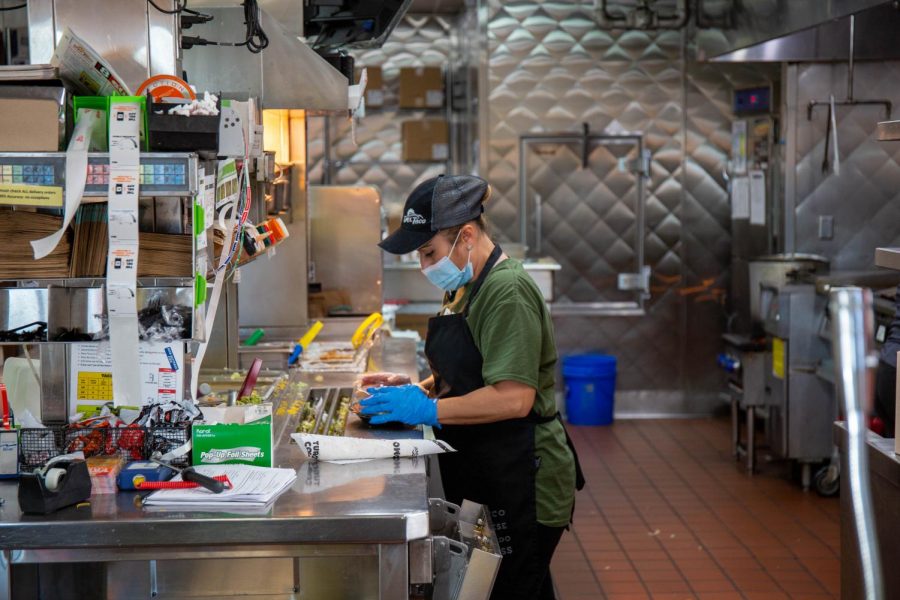Reese: It’s Time for a $15 Minimum Wage
Silvia Ocampo prepares drive through orders at Del Taco on 800 E and 400 S in Salt Lake City on Nov. 14, 2020. (Photo by Gwen Christopherson | The Daily Utah Chronicle)
November 19, 2020
The Trump administration has allowed at least six million Americans to fall into poverty during the economic recession prompted by the COVID-19 pandemic. President-elect Joe Biden and Vice President-elect Kamala Harris will have a lot of work to do in the first 100 days of their administration to provide the relief that Senate Majority Leader Mitch McConnell and President Trump refused to offer after the initial stimulus bill. However, there is a quick and easy way the federal government could support poor Americans as we work through this crisis: Biden could increase the minimum wage to $15 through an executive order. People need a wage that can provide a roof over their head, food on their table and clothes to keep them warm. The Biden administration can and should raise the minimum wage on day one of their administration.
Why We Need an Executive Order
In a recent interview, Senate Minority Leader Chuck Schumer said that “America demands” drastic change not only to offer people relief during the pandemic but to create an equitable society. Schumer believes that President-elect Biden can answer America’s demands with executive orders. This would allow him to bypass the legislative gridlock Senator McConnell has facilitated over the past six years (unless Democrats clinch both of Georgia’s Senate runoffs and win the majority, rendering such a bypass unnecessary).
Senator Schumer also hopes that an increased minimum wage could be a part of those executive changes. “Raising the minimum wage to $15 an hour… we believe that Joe Biden can do that with the pen as opposed to legislation.” Biden is in favor of raising the minimum wage, as are 67% of Americans. Even Florida, a state Trump won in the recent election, has voted to raise the state minimum wage to $15, demonstrating that Americans can’t wait any longer for the change.
Benefits for People and the Economy
Raising the minimum wage would increase the income of 27.3 million workers and help lift 1.3 million workers out of poverty, in addition to stimulating the economy and helping pull the United States out of the pandemic recession. During past wage increases, families have bought more cars, homes and even frequented restaurants more often. In other words, increasing workers’ purchasing power will help the US rebound faster from the pandemic-induced economic crisis.
Roughly 70% of essential workers, many of whom are women and/or people of color, have not received any kind of hazard pay or raise to compensate for the risks of working during the pandemic. These minoritized groups are already underpaid in relation to their white male counterparts, with Black and Hispanic women facing the biggest wage discrepancies — so they have to put their lives on the line, often in multiple jobs, in their efforts to survive. Raising the minimum wage will give women of color a greater chance to work toward something beyond mere survival.
Increasing Little by Little to Keep Small Businesses Open
The main concern with raising the minimum wage is that business owners will not be prepared to properly pay their workers. But the minimum wage has been $7.25 for a decade, and in 2019, the Economic Policy Institute estimated that only about 5% of the US workforce was earning less than $9 an hour. Still, progressive policymakers recognize that businesses, especially small ones, are struggling during the pandemic — so they don’t expect that the jump to $15 would occur overnight. The House of Representatives passed legislation to raise the minimum wage in July 2019. The bill called for raising the wage over a six-year period, with an immediate increase to $8.40 followed by incremental progress until it reaches $15 per hour. At the time this bill passed the House, the minimum wage was on track to reach the $15 mark by 2025. That is the same year advocates of raising the wage believe to be a reasonable target date. This progressive increase, implemented over a few years, would allow business owners to raise wages without an undue shock to the bottom line.
A series of temporary stop-gap measures passed in Congress are evidence of a failed economic system that lacks structure and stability, with no concern for the long-term picture or well-being of the citizens it presumably serves. If any given business has jobs that cannot sustain a wage of $15 an hour, the business itself is either underpricing goods and services, lacks demand for those goods and services, or, as is often the case, is diverting unwarranted returns directly to owners of capital. Ultimately, paying low wages while generating large profits forces the government to step in and provide support, though meager, for its economically deprived citizenry. In other words, such an economic model forces the government to subsidize the capitalist class — it’s welfare for the rich.
America’s entire economic system has a deep-rooted bias favoring capital over wages. This phenomenon manifests itself in taxation policies and a rapidly rising income inequality crisis that threatens to engulf the vast majority of American workers. This is not surprising given that wealthy people drive policy in the US. It’s time to redraw policy in favor of the majority of citizens, in favor of those who actually produce goods and services — in favor of American workers. It’s time for our country’s hourly minimum wage to be $15, and President-elect Biden has the power and responsibility to make that happen.









